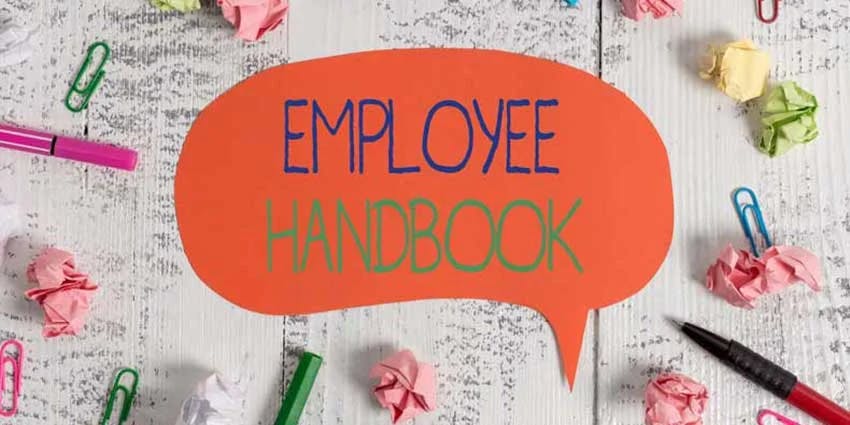While most businesses have an employee handbook, they as rarely as effective for the business as they should be. The key to a great handbook is getting the big parts right: policies, company culture, and presentation. The goal is for your handbook to have a significant impact on the way your company operates. A great handbook is always a dynamic document. This means that when a problem arises, you aren’t brushing off the dust of a handbook that hasn’t been touched in years. This all begins with the building blocks of an employee handbook. On this page, you will find the process of compiling your handbook broken up into three clear steps to help you navigate the confusion often associated with employee handbooks.

Key takeaways:
- Your policies matter most
The heart of any handbook is the policies. These policies are required for any locations where your employees work. Having clear policies for your team that include federal, state, and local requirements can keep you out of hot water on compliance issues. They also take away all the guesswork on what your employees are entitled to and what is required.
- Company culture is key
It’s not just about policies though. It’s also about setting the tone, and articulating what makes your company great. Every handbook should be your best attempt at the company you want (even if it’s not the company you currently have). It should reflect the company’s culture, mission, and values.
- Check out examples of great employee handbooks
If this sounds daunting, don’t worry. We’ll share great examples of the best handbooks out there. There’s no shortage of inspirational companies to help guide the way.
- Use our employee handbook checklist
The building blocks for a great handbook include these items. The best handbooks blend clear, effective policies with your unique culture, mission, and vision for the company.
Why building a terrific handbook is worth the effort
Sample employee handbooks
We’ve curated a list of employee handbook examples that we think are interesting (for all kinds of reasons). A common theme from each of these companies is that it’s clear that they are trying to make sure their handbook reflects their culture, and is a living document. We hope that you find some inspiration.
What's great about this handbook?
22Squared did such a great job here really unpacking their culture. It’s not exactly a “policy handbook”, but don’t let that stop you from learning from a masterful example of how to put the right vibes out there.

What's great about this handbook?
Besides having a robust handbook, Pronto Marketing has fully integrated their handbook into their company marketing website. It communicates that their culture, policies and norms are designed to be seen and embraced.

What's great about this handbook?
Sonnedix has done a nice job personalizing their employee handbook. The message from their CEO and head of HR is personal and compelling. It’s clear they designed their handbook to be read, and they have taken care to try to communicate their values as a renewable energy company.

What's great about this handbook?
Brinker International (a hospitality company behind many restaurants you’ve eaten at) has done a masterful job with an engaging guide on its core values. Their guide to making good decisions is particularly well done. The goal is clear: set a high bar and remind employees to engage their own values.

What's great about this handbook?
Meta has focused its “code of conduct” on the principles that should guide employees instead of very specific do’s and dont’s. Although this might not be ideal for every company, it’s inspiring.
What's great about this handbook?
ConvertKit is a great company and they nailed a simple, elegant handbook that unpacks some operating norms as well as their culture. They get bonus points for integrating it into their marketing site to be used as a recruiting tool.

Add your company policies
1. Introduction and core policies
This is where you set the stage for the employee relationship. It describes a company that is committed to great work, fairness, and a mission.
- Welcome and mission statements
- Equal employment opportunity statement
- Employment-at-will
- Handbook disclaimer statement
- Employment categories
- Company mission statement
- Introductory Period
2. Time away from work and other benefits policies
Not having clearly defined policies around time away from work is a major source of friction and can be problematic for the business. Clear up any ambiguity here.
- Benefits overview
- Paid holidays policy
- Jury duty, voting leave, military leave
- Vacation benefits
- Health insurance
- Sick leave policy
- Family and medical leave (FMLA)
3. On-the-job practices and policies
Define your company norms and practices including payroll, timekeeping, schedules, and the nuts and bolts of day-to-day operations.
- Health and safety policy
- Open door policy
- Employee introductory period
- Payroll
- Working schedule policy
- Direct deposit policy
- Company vehicles policy
4. Standards of conduct
This is where employee rules and expectations should go. There can be a lot of them, and this is an important part of any handbook.
- Non-harassment and non-discrimination policies
- Sexual harassment and workplace violence policies
- Attendance policies
- Conflicts of interest, confidentiality, and business ethics
- Health and safety policies
- Work-from-home and virtual meetings policies
6. State and local policies
Each state (and now many cities and counties) have their own specific policies that apply to any employee in those locations. Having these policies in your handbook reduces friction and can keep employers out of hot water. It’s always best to review your handbook with your trusted advisors (including your attorney) to review your final handbook.
- See our 50-state breakdown of policies
Write a strong company mission statement
A good mission statement will get across a purpose. A great mission statement will communicate a company’s specific values, principles, and goals as an organization. While this is key for customers to understand your company, it is essential for employees to have a strong company mission statement to build off of. A great company mission statement can serve as the foundation for growth and a way for employees to assess the values and culture of their employer. The statement should be relatively brief so that it can be remembered easily, but also comprehensive enough to include these key elements:
- Purpose: The statement should define the organization’s reason for existing, and clarify what the company is trying to do in the world.
- Values: The statement should express what principles the company upholds and believes in.
- Target audience: The statement should specify the main audience that the company caters to.
- Differentiation: The statement should clarify the unique value of a company, as well as explain what sets it apart from competitors.
Pandora Jewelry
Pandora's mission – then and today – is to offer women across the world a universe of high-quality, hand-finished, modern, and genuine jewelry products at affordable prices, thereby inspiring women to express their individuality.
This statement expresses Pandora’s commitment to providing women with high-quality, accessible jewelry that inspires them to be themselves. This highlights various company values such as accessibility, inclusion, inspiration, and innovation.
Patagonia
Build the best product, cause no unnecessary harm, and use business to inspire and implement solutions to the environmental crisis.
This statement reflects Patagonia's commitment to creating high-quality outdoor gear while minimizing its environmental impact. It emphasizes the company's core values of sustainability, social responsibility, and innovation, and its goal of using its business to make a positive difference in the world.
Tesla
To accelerate the world's transition to sustainable energy.
This short, yet effective mission statement reflects Tesla's mission to promote renewable energy and reduce the world's dependence on fossil fuels. It emphasizes the company's innovative spirit and its vision of a more sustainable future, and it inspires employees and customers alike to join Tesla in its mission to create a cleaner, healthier planet.
Design your handbook to fit your company culture and voice
After you have compiled all of the content for your employee handbook, it is time to switch to a design-oriented mindset. While it may seem trivial, spending time designing your handbook is an integral piece of the process. The way content is presented does a great deal to communicate your company culture and voice to employees. For example, imagine a handbook that has no color, solely prints the policies and is stapled together sloppily. This will convey a much different message than a handbook with the same content, but that has splashes of color, creative fonts, humor, and is well-bound. Similarly to many other things in a company, presentation matters.
Take a look at the “Handbooks we Love” section for some great handbook examples! These companies took advantage of designing their handbook to open opportunities for conveying more information about the company.
Employer Tips
Pro tips for creating a great employee handbook
- Make your handbook easy to read and accessible to everyone
- Distribute your handbook digitally (Handbooks.io provides live link sharing!)
- Adjust any policies to reflect your company’s unique culture
- Be sure to include state and city-specific policies. You need policies for every state where you have employees
- Keep your federal, state, and local policies up to date, as they change frequently
Employee Handbook Resources
Best practices, guidance and information for companies






